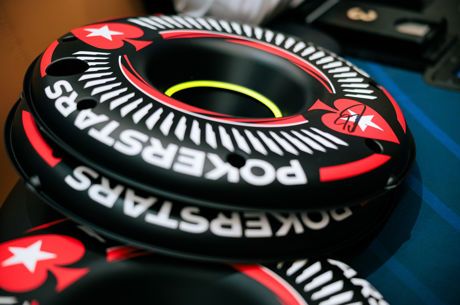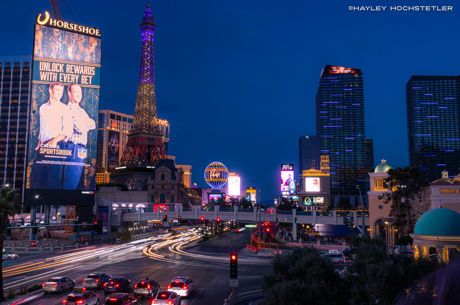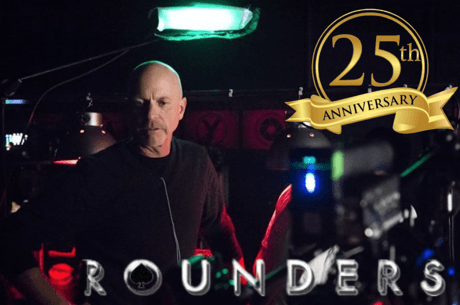Poker & Pop Culture: A Look at Card-Playing Astronauts on Moon Landing Anniversary

Today is a special anniversary. Fifty years ago today — July 20, 1969 — the Apollo 11 lunar module touched down on the surface of the moon. About six-and-a-half hours later, astronauts Neil Armstrong and Buzz Aldrin, Jr. became the first men ever to walk on the moon.
As is the case with just about every other area of American popular culture, poker has played a role in the space program over the years.
Science fiction films sometimes portray lonely astronauts biding their time playing cards with one another, even if doing so presents a somewhat tricky proposition given the weightless environment with which they must contend. That said, card playing is one of several recreational activities — along with reading books, listening to music, playing Scrabble (with Velcro on the tiles), and communicating with loved ones back on Earth — that astronauts spending months at a time aboard the International Space Station have enjoyed.
Looking back to origins of the space race, wherein the United States found itself in competition with the Soviet Republic in the effort to conquer space and eventually land a man on the moon, the struggle was often compared to a large scale political poker game full of bluffs and reraises as the stakes grew ever higher. (The same was true for the Cold War, generally speaking.)
The successes of the first two Sputnik missions in 1957 did much to ignite the subsequent American effort. For a time engineers at Jet Prepulsion Laboratory in Pasadena dubbed their mission "Project Deal." That's because Jack Froehlick, the project's manager, was himself a poker player. As he told John Noble Wilford for a New York Times article on the history of the space program, "When a big pot is won, the winner sits around and cracks bad jokes, and the loser cries, 'Deal!'"
As it happened, much of the planning for the subsequent lunar missions took place not far from Las Vegas, the capital of poker and gambling, in the desolate Nevada desert. In fact, 11 of the 12 men who have walked on the moon readied for their missions at the Nevada Test Site.
Located about 65 miles north of Las Vegas, Armstrong, Aldrin, and other future moonwalkers all participated in training sessions in the desert, a "virtual lunar landscape" as described by aerospace historian Peter Merlin. From the mid-1960s through 1972, NASA had astronauts in the Nevada desert practicing gathering samples and driving the lunar rover training vehicle.
Another research facility where rockets have been tested also has a connection with poker — the Poker Flat Research Range owned and operated by the University of Alaska's Geophysical Institute, the name for which can be traced back to Bret Harte's 19th century short story "The Outcasts of Poker Flat."
But poker's role in America's space program goes beyond coincidences of geography and the names of projects and research facilities. Apparently, the game served as an important part of preflight preparations, too.
Certain superstitions were often followed prior to missions, including the serving of the same scrambled egg and steak breakfast favored by Alan Shepard, the first American in space. Another ritual repeated before every mission was one in which the commander of the mission played cards with the tech crew, continuing the game until he lost a hand.
As Alan Murphy explains in a 2008 article for The Space Review titled "The Losing Hand: Tradition and Superstition in Spaceflight," the "card game [has been] variously described as a type of blackjack and as a kind of five-card poker," although "apparently nobody knows who began this custom." Murphy speculates it likely began a few years earlier with the Gemini missions, the first to involve two-man crews (and thus a commander).
Another NASA tradition during the sixties was to wake up astronauts with music, with the 1965 hit "Houston" by Dean Martin a frequently chosen selection. For poker players, the song's sad sack story of a broke man walking back to Houston in the rain connects with a famous poker term "Walking Back to Houston."
Poker Hall of Famer and Texas native TJ Cloutier once explained the term's origin. "Those Houston players would come to Dallas and play that ace-king, but they'd always end up against a pair of aces. That's why we call that hand 'Walking back to Houston'" (quoted in The Poker Encyclopedia, edited by Elkan Allan and Hannah Mackay).
In the days following the return of Apollo 11 fifty years ago, there was some concern regarding the fifty pounds or so of moon rocks the astronauts brought back with them. Some scientists believed the rocks could contain microbes that might have harmed the men and/or would unfavorably affect the earth's ecosystem. Extensive tests were performed on the rocks, during which time the astronauts were quarantined for a period so as to ensure they had escaped any harmful effects.
What did the astronauts do during their period of confinement? You guessed it. As Wilmot Hess, who worked with NASA's Manned Spacecraft Center in Houston during the time of the Apollo missions, told Carol Butler of NASA's Oral History Project, the men spent their days "drinking bourbon and playing poker and whatnot, and having a good time."
The moon landing was indeed an amazing moment in history, and deservedly once again captures our notice a half-century later. As such a significant part of American culture and history, it isn't surprising to see poker turning up as part of the story of the U.S. putting the first men on the moon.
Save these anecdotes, perhaps to bring up the next time someone in your poker game hits a lucky card and describes it as an "ace from space."
Martin Harris is the author of Poker & Pop Culture: Telling the Story of America's Favorite Card Game, available now via , , and elsewhere.
Photo: "” (adapted), public domain.









